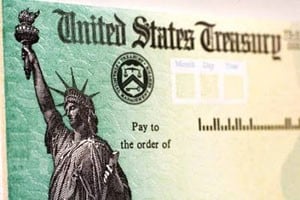Believe it or not, I'm not always a harbinger of doom.
Today I have a recommendation for you that's nothing but positive.
My suggested portfolio is 10% to 20% cash (the same amount I allot to gold, so you know I'm a cash fan). Here's what I suggest you do with yours.
The securities I'm about to discuss are far safer than the bank. (Especially if you have cash in one of these disasters.)
They're extremely liquid.
And I prefer them to cash because when you hold cash at a bank or a brokerage firm, you can become a general creditor if the firm goes bankrupt. But if you own these securities, you are a creditor of the U.S. government. That makes them virtually risk-free (at least for now).
They are low return (after all, there is no yield on cash these days), but still better than you'll get from the bank.
And they're very, very safe.
Here's what they are and how to get them...
My Favorite Place to Put Cash Right Now
 My favorite "alternative" place to put cash is in one-month or three-month Treasury bills. Not bonds; not notes; bills. Remember that this is not an "investment" but a sort of secure parking area.
My favorite "alternative" place to put cash is in one-month or three-month Treasury bills. Not bonds; not notes; bills. Remember that this is not an "investment" but a sort of secure parking area.
One-month and three-month T-bills are available in denominations of $1,000 up to $5 million. Here's how they work.
As I said earlier, you won't get a great return on T-bills because they're so exceptionally safe. They're considered virtually risk-free, and they're also exempt from state and local income taxes (though still subject to federal tax). You buy them for less than the face value (also called the par amount) and then hold them until maturity, at which point you cash them in for the full value. So you might buy a $1,000 bill for $990 and then cash out for the full $1,000. If you cash out before maturity, obviously you don't get the full value.
If someone cashes out a bill before it's matured, there's some money left over, which you can bid for on the "secondary market." You can ask your broker to help you with this, or you can do it yourself if you have a brokerage account with someone like Fidelity or Schwab.
How to Buy
[mmpazkzone name="in-story" network="9794" site="307044" id="137008" type="4"]
One-month (four-week) bills are normally auctioned on Tuesdays, and three-month (13-week) bills are auctioned on Mondays. You can purchase them through the U.S. Treasury website. There's no such thing as a paper Treasury bill anymore; you have to get them electronically.
You can choose whether to make a non-competitive or a competitive bid on Treasury bills.
- "Non-competitive" means that you agree to accept the government's discount rate upfront. (Hint: You probably won't be getting much of a return.) The upside of this is that individuals can purchase non-competitively all by themselves through TreasuryDirect - no broker needed - and they're also guaranteed to get the full amount.
- In order to make a "competitive" bid, you have to go through your broker or financial institution, or have a TAAPS account. This avenue offers you the potential for a bit more return, but there's also more uncertainty. You specify the minimum discount rate you are willing to accept. If it's less than the discount rate the government has already decided on, you win the bid. If you come up with the same number as the government, you may win the bid, but in a lesser amount than you were hoping to get. If your discount rate is higher than the government's, then you lose.
There's no fee to open a TreasuryDirect account, and there's also no fee for individual investors to buy Treasury bills from TreasuryDirect. If you buy Treasuries on the securities market through a broker or dealer, however, you'll pay a commission and possibly a transaction fee.
Redemption and Reinvesting
You don't have to do anything to redeem your Treasury bills - the government takes care of it for you. (This is one of the few times that's ever going to happen!) On the day the bill matures, they deposit the proceeds automatically into your bank account, using the banking information you gave them when you set up your account.
But of course, the point of this exercise is that you DON'T want to put that money in the bank.
So instead of "cashing out" at the end of the one- or three-month period, you set up your account to roll the proceeds over into buying a new bill of the same term and type for the next month (a process called reinvestment). You can schedule a reinvestment when you buy your initial bill, or you can wait until up to four days before it expires. And when you set up your account, you can schedule bills for reinvestment for up to two years.
I hope you find this helpful.
Follow Money Morning on Facebook and Twitter.
Editor's Note: This year, your most valuable asset may be Michael Lewitt's free Sure Money service. In Sure Money, Michael helps you see what's going up, what's going down, and how to profit. Sign up now by clicking here, and you'll get instant access to all of Michael's investing tips, recommendations, and specific instructions, including his exclusive "Super Crash Report."
About the Author
Prominent money manager. Has built top-ranked credit and hedge funds, managed billions for institutional and high-net-worth clients. 29-year career.



